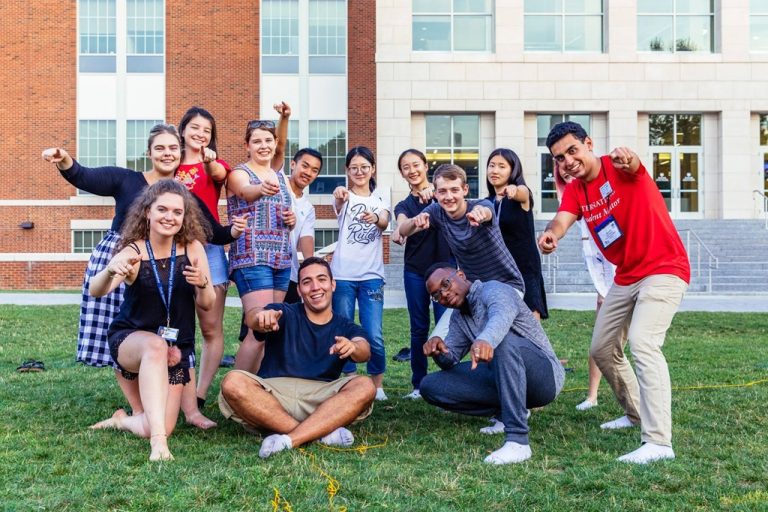How to Choose the Right Summer School Program for Your Interests: A Comprehensive Guide
How to Choose the Right Summer School Program for Your Interests: A Comprehensive Guide
With an increasing number of summer school programs available worldwide, selecting the right one can be an exciting yet daunting task. Whether you’re looking to deepen your understanding of a particular subject, gain new skills, or explore a potential career path, finding the right program requires careful evaluation. High school students and parents alike often grapple with questions about how to balance academic rigor with personal interests, how to assess extracurricular opportunities, and how location factors into the decision-making process.
This guide will walk you through the essential considerations when choosing a summer school program tailored to your interests. From evaluating academic offerings and the types of extracurricular activities available to considering the importance of location, this article will provide you with a comprehensive roadmap to ensure you make the best decision for your goals.
1. Define Your Goals and Interests
The first step in choosing the right summer school program is to clearly define your goals. What do you hope to achieve by attending a summer program? This could range from academic enrichment and preparation for college applications to personal development or exploring a future career path.
Start by asking yourself the following questions:
- Academic Interests: Do you want to focus on a subject you are already passionate about, such as biology, literature, or computer science? Or are you curious to explore something new, like entrepreneurship, digital media, or artificial intelligence?
- Skills and Experience: Are you looking to gain hands-on experience, such as conducting research in a laboratory or working on a creative arts project? Alternatively, are you seeking to enhance specific skills like public speaking, problem-solving, or leadership?
- Personal Growth: Are you interested in developing soft skills, such as communication and teamwork, or are you focused on building a sense of independence by living away from home for the first time?
- College Preparation: Are you hoping to strengthen your college applications through rigorous academic programs or unique extracurricular experiences that demonstrate your commitment to learning and exploration?
Having clear goals will help you narrow down your options and focus on programs that align with your academic and personal objectives. If you’re unsure about your interests, consider speaking with teachers, counselors, or even professionals in fields you might want to pursue for additional guidance.
2. Research Academic Offerings
Once you have a clear idea of your goals, it’s time to dive into the academic aspects of summer programs. Each program will offer different courses, so it’s important to research and evaluate the curricula to ensure they align with your interests and future academic plans.
2.1 Subject Specialization
Some summer school programs are broad in scope, offering a wide range of subjects for students to choose from, while others are highly specialized and focus on a particular area, such as STEM, the arts, or business. Consider your academic interests and decide whether you prefer to attend a general program where you can explore multiple topics or a specialized program where you can deeply engage with one field.
If you already know what subject you want to pursue, a specialized program can provide an immersive experience that goes beyond what you typically learn in high school. For example, if you’re passionate about marine biology, attending a summer program that offers hands-on research opportunities in a coastal region can give you a significant head start.
2.2 Faculty and Instruction Quality
Another key consideration is the quality of instruction. Summer programs hosted by universities often feature professors or graduate students who are experts in their fields, while others may invite guest speakers or industry professionals. Look into the qualifications of the instructors and the teaching style of the program. Are you more comfortable in a traditional lecture-based environment, or do you prefer interactive, project-based learning?
In some programs, students may have the opportunity to engage in research projects, work closely with mentors, or participate in workshops. These experiences can provide invaluable learning opportunities, particularly for students interested in pursuing advanced studies or research-based careers.
2.3 Academic Rigor
Assess the level of academic challenge offered by each program. Some summer programs are designed to be intensive and demanding, providing a glimpse into what college-level courses might feel like. These can be excellent choices if you’re looking to push yourself and test your academic limits. On the other hand, some programs may be more relaxed, giving you the chance to enjoy your summer while still engaging in intellectual exploration.
If you’re applying to college soon, choosing a rigorous program can demonstrate your academic commitment and willingness to challenge yourself, which can strengthen your college application. However, be mindful of balancing academic intensity with your capacity for handling stress and workload, especially if you want to enjoy other aspects of the program.
3. Evaluate Extracurricular Opportunities
While academics are a key component of any summer school program, extracurricular activities can significantly enrich your experience. Many summer programs offer opportunities to participate in clubs, workshops, sports, and other activities outside of the classroom. These extracurriculars are not just for fun—they can help you build soft skills like teamwork, leadership, and time management, all of which are important for personal growth and future success.
3.1 Program-Specific Activities
Some programs offer unique extracurricular opportunities tied directly to the academic theme of the program. For example, a summer program focused on entrepreneurship may include business plan competitions or pitch presentations, while a creative writing program may offer opportunities to publish your work or collaborate with other young writers. These types of activities allow you to apply what you’ve learned in a real-world context, deepening your engagement with the subject matter.
3.2 Leadership and Community Involvement
If you’re interested in developing leadership skills, look for programs that offer leadership workshops, student councils, or volunteer opportunities. These experiences can help you build confidence and take on responsibilities, which are highly valued by college admissions committees and future employers. Community involvement, whether through service projects or working with local organizations, can also provide meaningful experiences that make a lasting impact on your personal development.
3.3 Social and Cultural Activities
Summer programs are also a great way to meet new people and make lasting friendships. Many programs include social events like group dinners, excursions to local attractions, or cultural exchange activities. These events allow you to bond with your peers, learn about other cultures, and broaden your social network. For international programs, this can be an invaluable opportunity to connect with students from different countries and backgrounds, enhancing your global perspective.
When evaluating extracurriculars, think about how you’d like to spend your time outside of the classroom. Are you looking to participate in sports or outdoor activities? Would you enjoy spending time in a student-led club or organization? Extracurriculars can greatly enhance your overall experience, so be sure to consider what the program offers beyond academics.
4. Consider the Program’s Location
The location of a summer school program can play a crucial role in your overall experience. Whether it’s in a bustling city, a serene rural area, or even a foreign country, the setting will influence both your learning environment and your extracurricular opportunities. When deciding on a location, consider how it aligns with your personal preferences and academic goals.
4.1 Urban vs. Rural
Urban programs are often based in major cities with access to a wide range of cultural and social activities. If you enjoy exploring museums, attending performances, or immersing yourself in the energy of a bustling metropolis, an urban location might be ideal. Cities also provide access to internships, company visits, or guest lectures from industry professionals, which can be particularly valuable for students interested in fields like business, technology, or the arts.
In contrast, rural or campus-based programs offer a more tranquil and focused environment, often with more opportunities for outdoor activities such as hiking, kayaking, or ecological studies. These programs are often held on university campuses, providing a taste of what campus life is like. If you prefer a quieter setting with fewer distractions, a rural or campus-based program might be more suited to your needs.
4.2 Domestic vs. International
Choosing between a domestic or international program is another important factor. International programs offer the chance to immerse yourself in a new culture, practice a foreign language, and gain a broader perspective on global issues. They can be particularly valuable if you are considering studying abroad in the future or pursuing a career with an international focus.
However, attending an international program also comes with unique challenges, such as adjusting to cultural differences, navigating language barriers, and managing logistics like travel and currency exchange. If you’re ready for an adventure and excited by the idea of living in a new country, an international summer program can be an incredibly enriching experience.
If you prefer to stay closer to home but still want a diverse experience, look for domestic programs that attract students from a variety of backgrounds and regions. This can offer many of the same benefits of international exposure without the logistical hurdles of traveling abroad.
5. Practical Considerations
In addition to the academic, extracurricular, and location-related factors, there are several practical considerations that should influence your decision.
5.1 Program Duration
Summer school programs vary in length, ranging from one week to several months. Consider how much time you’re willing and able to dedicate to a program, especially if you have other commitments over the summer. Shorter programs may allow you to attend multiple programs or take part in internships or family activities, while longer programs offer a more immersive and in-depth experience.
5.2 Cost and Financial Aid
Cost is another critical factor, as summer programs can be expensive, especially those hosted by prestigious universities or located abroad. Be sure to research the full cost of the program, including tuition, travel expenses, room and board, and any additional fees for activities or excursions.
If cost is a concern, explore scholarship and financial aid options. Many programs offer need-based financial aid or merit-based scholarships that can significantly reduce the cost of attendance. Additionally, some organizations provide grants for students interested in specific fields of study, such as STEM or the arts.
5.3 Application Requirements
Finally, consider the application process and requirements for each program. Some programs are highly competitive and may require a detailed application, including essays, recommendation letters, and academic transcripts. Be sure to review the application deadlines and requirements well in advance so you have enough time to prepare and submit a strong application. If you are applying to a program that aligns with your academic or career interests, take the time to craft thoughtful essays that demonstrate your passion for the subject and your readiness to take full advantage of the opportunity.
In some cases, programs may have specific eligibility criteria, such as minimum GPA requirements, grade levels, or prerequisites in certain subjects. Make sure you meet these qualifications before investing time in the application process.
6. Get Insights from Alumni and Program Reviews
To gain a better understanding of what to expect from a summer program, it’s helpful to read reviews or testimonials from previous participants. Many program websites feature alumni stories or feedback that can provide insights into the academic experience, living conditions, and overall student satisfaction. You can also reach out to alumni directly, if possible, to ask about their personal experiences and whether they felt the program helped them achieve their goals.
Online forums or social media groups can also be valuable resources for learning about different programs. Students and parents often share their experiences, offer advice on what to expect, and provide practical tips for making the most of the program. Hearing from those who have already gone through the process can give you a clearer picture of whether a particular program is the right fit for you.
7. Trust Your Instincts
Ultimately, while thorough research and evaluation are critical, it’s also important to trust your instincts when choosing a summer program. You know your interests, strengths, and personal preferences better than anyone else, so listen to your gut feelings about what type of experience will be the most fulfilling for you.
A program that might be a perfect fit for one student may not resonate with another, and that’s okay. You should feel excited about the prospect of attending the program, not overwhelmed or pressured. Look for a balance between academic challenge and personal enjoyment, and choose a program that aligns with your unique interests and goals.
Conclusion
Selecting the right summer school program is a major decision, but with careful planning and thoughtful consideration, you can find the experience that best suits your academic and personal interests. From evaluating academic offerings and extracurricular activities to considering location and practical factors like cost and duration, there are many elements to weigh in your decision.
Ultimately, the right program will challenge you, inspire you, and help you grow both academically and personally. Whether you’re looking to explore a new subject, build leadership skills, or immerse yourself in a different culture, the right summer program can be a life-changing opportunity that sets you on a path toward future success. By taking the time to reflect on your goals, research your options, and consider what matters most to you, you can make an informed choice that will lead to a meaningful and enriching summer experience.






